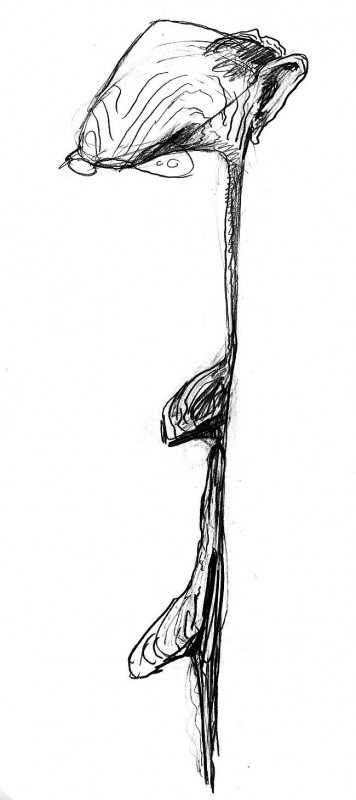 Former Sen. Alan Simpson has always been a loose cannon with a kind of folksy arrogance, which I always liked. His latest cracks about Social Security, though, don’t crack me up. And that’s because he is on a panel appointed by Pres. Obama to come up with solutions to the long-term funding problem and all he can say is that Social Security IS the problem. It’s not that he’s nuts, he’s just another Creature from the Republican Lagoon. Here’s Charles Dickens’ description of Uriah Heep, Simpson’s body double:
Former Sen. Alan Simpson has always been a loose cannon with a kind of folksy arrogance, which I always liked. His latest cracks about Social Security, though, don’t crack me up. And that’s because he is on a panel appointed by Pres. Obama to come up with solutions to the long-term funding problem and all he can say is that Social Security IS the problem. It’s not that he’s nuts, he’s just another Creature from the Republican Lagoon. Here’s Charles Dickens’ description of Uriah Heep, Simpson’s body double:
[Uriah’s face] was quite as cadaverous as it had looked in the window, though in the grain of it there was that tinge of red which is sometimes to be observed in the skins of red-haired people. It belonged to a red-haired person—a youth of fifteen, as I take it now, but looking much older—whose hair was cropped as close as the closest stubble; who had hardly any eyebrows, and no eyelashes, and eyes of a red-brown, so unsheltered and unshaded, that I remember wondering how he went to sleep. He was high-shouldered and bony; dressed in decent black, with a white wisp of a neckcloth; buttoned up to the throat; and had a long, lank, skeleton hand, which particularly attracted my attention, as he stood at the pony’s head, rubbing his chin with it, and looking up at us in the chaise.
And here’s Robert Kuttner’s take on Simpson and the BS campaign to kill Social Security:
When you think about it, Alan (“Tits”) Simpson is the ideal jester to deflect attention from the bigger joke — the fiscal reform commission itself. The problem is less Simpson’s dopey comments and more the idiocy of the rest of the commission.
Given what is happening to the real economy in the real world, the prospect of a double-dip recession and the prospect of a lost decade of high unemployment, the idea that the bigger menace is Social Security is just whacko. Let’s recall that Social Security is in surplus until 2037!
Yet the idea that the road to recovery leads though cuts in Social Security, Medicare, and other social outlays that are keeping the depression from worsening, if anything, is gaining traction among opinion elites.
Exhibit A is a doubly dishonest column by the New York Times‘ new whiz-kid pundit, Matt Bai, who used a liberal congressman, Earl Blumenauer of Oregon, as a prop to make his misleading case.
According to Bai’s column, Security is like a giant lottery, based on IOU’s that will require a Ponzi Scheme of further debt. Now, it turns out that Bai is not just wrong on the issues, but Blumenauer doesn’t believe what Bai attributed to him. In attacking the progressive coalition Strengthen Social Security, Bai wrote:
The coalition bases its case on the idea that Social Security is actually in fine fiscal shape, since it has amassed a pile of Treasury Bills — often referred to as i.o.u.’s — in a dedicated trust fund. This is true enough, except that the only way for the government to actually make good on these i.o.u.’s is to issue mountains of new debt or to take the money from elsewhere in the federal budget, or perhaps impose significant tax increases… So this is sort of like saying that you’re rich because your friend has promised to give you 10 million bucks just as soon as he wins the lottery.
But this is total malarkey. In fact, the 75-year projection of Social Security’s finances shows that under fairly pessimistic assumptions about economic growth, the shortfall in Social Security’s finances is just over half of one percent of GDP. Lift the cap on earnings subject to Social Security taxes, and the problem disappears.
More importantly, get wage growth back to its historic trend of increasing as productivity increases (rather than the top getting the benefit of all the economic gains) and the problem vanishes without changing the tax code. Raise wages, and we could increase Social Security benefits.
Bai not only distorted the reality of Social Security, but he also distorted Blumenauer’s views, cherry picking quotes from two interviews to make it seem that the congressman favored such drastic measures promoted by deficit hawks as cutting benefits or raising the retirement age. But the quotes in the column don’t say that — only Bai’s gloss on them — and the congressman believes nothing of the sort.
The trouble is that too many legislators make Delphic comments about whether Social Security should be “on the table,” Bluenenauer’s past vagueness gave Bai an opening, and Bai is all too representative of opinion elites — including the Washington Post editorial page, columnists like David Broder, many Democratic as well as Republican congressmen, and some in the Obama administration.
It was former Budget Director Peter Orszag, seconded by chief of staff Rahm Emanuel and the pollsters, who persuaded President Obama that the fiscal commission was a good idea. The theory was that the commission would give the president “cover” and demonstrate that he was fiscally responsible.
But as events have played out, this premise totally backfired. The commission provides plenty of cover all right, as in burial cloth. Its proposals could bury both the economy and this presidency.
The commission has given a platform to clowns like Simpson. But worse, it has lent credibility to the idea that Social Security is somehow a drag on the economy — creating a vicious circle of hawkish legislators and dishonest pundits like Bai feeding on each other.
The reality, of course, is that if the economy (and Obama’s fortunes) are going down the drain, the reason has nothing to do with Social Security’s finances in 2037 — and everything to do with slow growth, high unemployment, and the lingering effects of a damaged banking system right now.
Yet the storyline being peddled by the commission, of a dire fiscal crisis, makes it politically more difficult for Obama to take the necessary steps to get a recovery going.
There is a whole other path to economic recovery and fiscal balance. That other path has five parts:
- A lot more emergency federal spending now to create jobs and purchasing power.
- Increased taxes on the top two percent.
- A continued program of public investment in physical and social infrastructure
- A real public option on health insurance, to restrain medical inflation, which is the prime driver of federal deficits in the long run.
- A defense of Social Security as a key source of income for the elderly.
This strategy is better economics and better politics. Voters, by overwhelming margins, support Social Security. Over the years, Republicans have tried to tamper with it. And it is lunacy for Democrats to associate themselves with efforts to cut it.
But Obama’s own fiscal commission has painted the president into a corner. Virtually all of the remedies we need to get a strong recovery going are seen as fiscally too costly; and willingness to go after Social Security is being touted as the test of fiscal responsibility.
The campaign to fire Simpson has the right spirit but the wrong target. Obama should draw a line in the sand and make clear that if the commissioners propose cuts in Social Security, he will consider the whole exercise tainted.
Maybe we should be grateful for Simpson and his 310 million tits. If his antics lead serious commentators take a closer look at the commission, perhaps they will also look deeper into the fiscal foolishness of Simpson’s colleagues.
Robert Kuttner’s new book is A Presidency in Peril. He is co-editor of The American Prospect and a Senior Fellow at Demos.



